More actions
mNo edit summary |
|||
| Line 122: | Line 122: | ||
* '''Doomed Fates:''' Doomed Fates are Primal Revenants who died before they could complete their mission (religious, or for the Regalian Empire), so not cleansed Spirits or Spirits who socially hang out without explicit purpose. Doomed Fates are considered "Good Spirits" in the eyes of Aelrrigans, and while they shouldn't outright and transparently help them by fighting with them, they should indirectly aid them by keeping those who would ensnare or banish them off their backs, and making their work easier to complete, for when they do, Doomed Fates can be at peace and pass on into the afterlife that is reserved for them, which is the fastest way to be rid of them. | * '''Doomed Fates:''' Doomed Fates are Primal Revenants who died before they could complete their mission (religious, or for the Regalian Empire), so not cleansed Spirits or Spirits who socially hang out without explicit purpose. Doomed Fates are considered "Good Spirits" in the eyes of Aelrrigans, and while they shouldn't outright and transparently help them by fighting with them, they should indirectly aid them by keeping those who would ensnare or banish them off their backs, and making their work easier to complete, for when they do, Doomed Fates can be at peace and pass on into the afterlife that is reserved for them, which is the fastest way to be rid of them. | ||
* '''Magic Progress:''' Aelrrigan Knights are exceptionally politically active. Whether attempting to do so themselves, or urging and championing the cause of others outside of the Order, Aelrrigan Orders must ensure there is always some kind of pro-Magic legislation political party that aligns with their "freedom, but under order and control" policy towards Magic. This can be led by the Aelrrigans themselves, or by Noble allies in the peerage who look fondly on the Aelrrigans. The Aelrrigans should seek to reinforce such a political unity, and expand it by adding additional members or allies. | * '''Magic Progress:''' Aelrrigan Knights are exceptionally politically active. Whether attempting to do so themselves, or urging and championing the cause of others outside of the Order, Aelrrigan Orders must ensure there is always some kind of pro-Magic legislation political party that aligns with their "freedom, but under order and control" policy towards Magic. This can be led by the Aelrrigans themselves, or by Noble allies in the peerage who look fondly on the Aelrrigans. The Aelrrigans should seek to reinforce such a political unity, and expand it by adding additional members or allies. | ||
==Aelrrigan Armaments== | |||
Aelrrigan Armaments are people with limited rights to operate as part of the Aelrrigan Order, but only under the direct supervision of the Aelrrigan Knights. This means they do not have actual ranks of privilege and rights, but can fight alongside the Viridian Knights. Aelrrigan Armaments must follow the Code of the Order, or the spirit of the Code of the Order insofar they are able to, and assist other Aelrrigans in doing so as well. Aelrrigan Armaments are: | |||
* Attendant is a person, mundane or mage (not Automata, Homonculi, or Marken), who acts as a page to Knights. | |||
* Brood Armaments are [[Vampire]] Broods, with or without magic, who act as assistants and wards to the Knights | |||
There is a Registration duty for this Character type. If you play an Aelrrigan Armament, you must first secure an Aelrrigan to be subject to. When you have both that, and a Character Sheet, you can make a Ticket on the MassiveCraft Discord, and register your Aelrrigan Armament, which requires your in-game name, a link to your Character Sheet, and the name of the Aelrrigan your Character is subject to. Any Aelrrigan of any Chapter can retain any Armament, and there are no restrictions on the amount of Armaments, though each of these Armaments has some rules that apply across the board: | |||
====Attendant Armament==== | |||
Attendant Armaments are like pages, who act somewhere between a messenger, servant, bodyguard, and ally to the Aelrrigan Knights they follow. Attendant Armaments often carry weapons and armor around, help the Knight in and out of their equipment, carry banners, proclaim their arrival, or act as representative to where the Knight cannot personally attend. Attendant Armaments are explicitly not Squires, and have no intention of ever joining the Order fully. | |||
* Attendant Armaments can only ever serve one Aelrrigan Knight, and cannot do any Aelrrigan Knight business without that Aelrrigan Knight explicitly being present and instructing them to do so. The only exception is acting as messenger or envoy for their Aelrrigan Knight on their explicit orders. They must reject orders from other Aelrrigan Knights. | |||
* Attendant Armaments are by extension of their Aelrrigan Knight allowed to enforce the law along with their Knight, but never independently. They cannot place citizens under arrest, and can only ever function as helpers to the Aelrrigans that they serve in the field. | |||
* Attendant Armaments and their Aelrrigan Knights are not explicitly barred from fraternizing, but it is considered unkosher in a professional working environment, and potentially causes the Aelrrigan Knight to become conflicted in their priorities. Attendant Armaments are always replaceable and expendable, Aelrrigan Knights are not. | |||
* Attendant Armaments must always be commoners, because it would be too humiliating for a Noble to be a servant, even to a Knight. Aelrrigans are encouraged to take on the downtrodden as their Attendants to give them some livable wage, but Aristocrats can also become Armaments because Attendants indirectly receive the prestige of their Aelrrigan's success. | |||
* Attendant Armaments cannot ever rank up into being a Squire or Aelrrigan Knight fulltime, and should never try to aim for this either IC or OOC. Attendant Armaments are meant to appeal to the quintessential medieval Knight's page, they are more servant than Knight, and are only really suitable for people who stick to the concept long term because they adore the aesthetic of that servant role to a glory seeking Knight. | |||
====Brood Armament==== | |||
Brood Armaments function like the hired and protected wards of the Aelrrigan Order, who typically take on a supportive, scholarly role. While the Order, like all others, does not accept Broods into its ranks formally, many Aelrrigan knights created less direct positions that Broods could be "hired" into, leading to the formal establishment of the Brood Armament. Brood Armaments serve whatever role their respective Aelrrigan Knight needs of them, which is typically as assistant mages, scholars, medics, or as people who look after Chapterhouses. Brood Armaments are explicitly not Squires, and cannot ever join the Order. | |||
* Brood Armaments can only ever directly serve one Aelrrigan Knight, but can do Aelrrigan Knight business with other Aelrrigans. They must listen to orders from other Aelrrigan Knights, unless it conflicts with orders from their specific Knight. | |||
* Brood Armaments cannot enforce the law along with their Aelrrigan Knight, but can assist in protecting their Knight in combat. They can legally cast Magic, but only when directly and publicly ordered to do so by their Aelrrigan Knight. | |||
* Brood Armaments and their Aelrrigan Knights are allowed to fraternize, within reason, as the position requires the Brood be on board and willing. | |||
* Brood Armaments must always be commoners, because it would be too humiliating for a Noble to be a servant, even to a Knight. Aelrrigans are encouraged to take on the downtrodden as their Brood Armament to give them some livable wage, but Aristocrats can also become Armaments. | |||
* Brood Armaments have access to a badge that other Aelrrigans, certain Knights, and certain Metro members will recognize. This badge identifies them as a Brood Armaments, and shields them from the typical suspicion and hostility levied at Broods (especially by certain NPCs). Brood Armaments who are arrested for just being Broods, for example, can rely on this to ensure an Aelrrigan will come see them freed from Prison. Because these are made by Mage-Knight Caan, they are explicitly magical, and cannot be stolen, replicated, duplicated, or destroyed, except by entities on the same level as, or higher than, Caan. | |||
* Brood Armaments are enchanted by a unique spell that is proprietary to the Order, which only works on willing Broods who join as Armaments. The spell does not protect them from Sanguine infection, but if they are ever infected, it will immediately and instantaneously alert their Aelrrigan Knight that they have been infected, allowing for swift curing. This spell works regardless of distance, and can only theoretically be tampered with by higher powers. | |||
* Brood Armaments cannot ever rank up into being a Squire or Aelrrigan Knight fulltime, and should never try to aim for this either IC or OOC. Brood Armaments are meant to appeal to the honorable dhampir fantasy, which is typically unavailable to broods for knighthood. They are really only suitable for people who stick to the concept long term because they adore the aesthetic of that servant role to a glory seeking Knight. | |||
==History== | ==History== | ||
Latest revision as of 00:22, 27 March 2025
| Aelrrigan Order | |
|---|---|
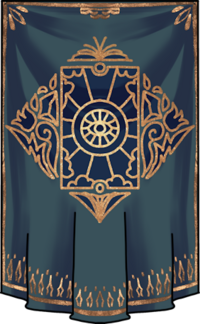 | |
| Order | |
| Pronunciation | Ail-ree-gan |
| Origins | Kintyr |
| Grandmaster | Mage-Primarch Caan |
| Colors | White, Dark Gray, Sky Blue |
The Aelrrigan Order is a Knightly Order primarily occupied with fighting the negative effects of Magic on the world, though by harnessing and teaching as opposed to repressing and peaceful cleansing instead of eradicating. Among the Aelrrigan Knights, Magic usage is very common, and they even provide safe ways to teach responsible Magic usage to others. Inversely however, the Aelrrigan Order has some of the most ruthless Mage-Hunters who track down what they call Renegade Mages (sometimes also called “Goz” for the Breizh word for mole, or just Renegade). Beyond their enforcement of responsible and moral usage of Magic, the Aelrrigan also hunt down Artifacts of Magic in order to keep them out of the hands of the common people, and lock them up into a fortification called an Enemohér, which those who speak Common often refer to as a Magi-Vault or Mohér. The Aelrrigan ply their craft somewhere between the laws of the land and their own moral codes, never quite being fully recognized and legalized in the same way the other Knight Orders had been, but still finding ways to fulfill their divine mission. The Aelrrigan follow the Dydd y Farn, which is loosely translated to the Doomsday Prophecy in Common, an extremely rare instance of three religions all convening for a common goal and concept, to warn the world about dangers and instructing their followers on what to do about it. The repository of all played Knights can be found here. When you make a new Knight character, please file a ticket in the Discord Ticket Bot to have them recorded. You only need to provide their name and Order.
Design
Aelrrigan Knights sit somewhere between the typical fantasy medieval feudal Knight, and the spell-blade warrior. Their Knight Order still predominantly appeals to the Knighthood aesthetic of the heavy plate armor, capes, swords and shields, but many of their members also use Magic or combine their normal fighting style with enchantments and Magic. Aelrrigan Knights are more personable than most other Knight Orders, but are capable of the same stiffness and sticking to rules when it comes to Renegade Mages. The following design limitations are enforced on the Aelrrigans:
- Aelrrigans can be of any people or culture, but they must be loyal to the Regalian Empire.
- Aelrrigans should gravitate towards melee weapons and plate armor aesthetic, but can incorporate a lot of Magic.
- Aelrrigans can also be exclusively Magic users, or have zero Magic at all, but should always be heavily armored.
- Aelrrigans can never be criminals, Afflicted, Marken, Evolism worshipers, or Mystech.
- Aelrrigans can be knowledgeable on Sealing/Dealing with Demons, but can never ever Summon Demons or actively use them.
Chapters
All Aelrrigan Knights are members of one single Chapter, which grants them a free non-Combat related Mechanic. Changing Chapters is permitted but only infrequently and only through a Staff Ticket where the request is reviewed. More background lore can be found about the Aelrrigan Mage Knights related to the Chapter Houses.
The Wayfarers
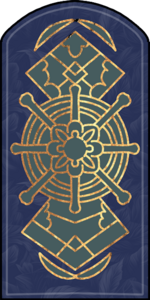
Wayfarers is the anglicized name of the Penn Archwilio. Penn Archwilio is the Chapter of the so-called wayfarers seated in Canolbarth, Kintyr, in the Regalian Archipelago. While the other Chapters primarily deal with the known and the established, and finding better ways to deal with known threats, the Penn Archwilio Chapter focuses on exploration and the pushing of magical boundaries to discover threats before they make contact the other way around. This is both done through a combination of physical exploration and sea faring to distant lands, and the more metaphysical exploration of the boundaries of Magic and keeping an ear to the ground for new discoveries in distant lands that the Aelrrigans may once need an answer for. Penn Archwilio Chapter members tend to be more prone to risky behavior and lone-wolf behavior, as many of them get sent on missions to far away lands where they get used to being self sufficient. Penn Archwilio holds a large fleet, the only Knight Chapter to do so.
| Winged Flight |
You can use Wings (of any Fae/Draconic/Mechanical design), while while out of Combat, allows Elytra flight, including the use of Rockets to gain more height and speed. Combat or Ability usage immediately disables flight and prevents flight until end of Combat. |
The Keepers
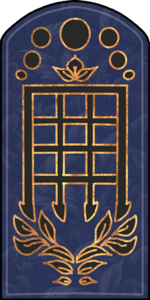
The Keepers is the anglicized name of the Penn Carchar Chapter. The Penn Carchar Chapter specializes in the taking, storing, and Artifactspark manipulation of Artifacts. Their Chapterhouse in Tirddwr, Kintyr, in the Regalian Archipelago, has the largest known library with information on all the known Artifacts around the world, along with the largest magical repository of locked up artifacts belonging to the Aelrrigan Order. Penn Carchar Chapter members tend to be disciplinary and rule-bound, believing more strongly in the Aelrrigan mission than the other Chapters due to their proximity with the extreme danger of Artifacts. There are infrequent Artifact breaches in Penn Carchar's Chapterhouse, resulting in casualties and chaos, and as such, they are always more on edge and alert than the other Aelrrigans because they know what calamity looks like. Penn Carchar members are exclusively Mages, as even without any Magic and coming in mundane, the very Chapterhouse itself instills Magic in those who enter.
| Honeyed Words |
You gain a +1 Bonus for every Persuasion /Dice roll, which is added to the final result. This Mechanic does nothing, if the Character already receives a +1, from for example Slizzar Heritage Mechanics. |
The Mound Guards
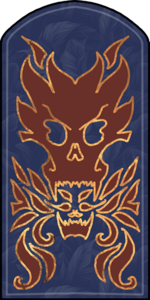
The Mound Guards is the anglicized name of the Stor Vardrhaug Chapter. The Stor Vardrhaug Chapter is controversially placed in country of Middeskag in a town called Blindheim. The Stor Vardrhaug Chapter specializes in the counteraction of Demon plots across the world, including but not limited to Arken, pacification of Demons, and treating with Demon Dukes to get rid of them. Stor Vardrhaug has a somewhat dubious reputation within the Aelrrigan Order, as though the order widely speaking disapproves of Demon interactions of any kind, Stor Vardrhaug sometimes dips its toes in interacting with Demon Dukes to fight lesser Demons with more overwhelming force. This Chapter notably recruits Arkenborn, both to keep them in line, but also to use their unique skills and kindred nature to other Demons to fight fire with fire, leading them to generally be thought of as the least trustworthy chapter, yet also indispensable when dealing with Demons of any kind.
| Demon Kindred |
Demons see you as one of them, despite not being a Demon yourself. During Duke Summonings, the Duke will not use anything you say against you or as extra cost. You can Veilwalk without negative consequences, and Demons cannot possess you, or consume your soul under any circumstances, meaning you have some natural protections against Demons that other mortals do not. |
The Magelights
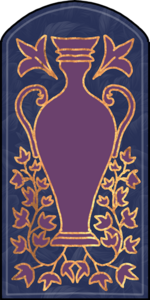
The Magelights is the anglicized name of the Hechiceros Chapter. The Hechiceros Chapter in Girobalda in the south of the Archipelago, is a newer Chapter, created to act both as teachers to those who want to safely learn Magic, but also to keep a close eye on the proliferation (and repression) of Magic through Religion. They specifically know a lot about Religions to tackle the moral quandries created by the people claiming religious right to Magic, or claiming religious right to kill Mages. The Hechiceros Chapter is usually also called in to handle Limit-Breaking Mages so long as they haven't become possessed by a Spirit yet, able to bring a halt to their Limit-Break remotely, and guiding them through the process of shutting off their Magic so that they can calm down. Hechiceros Knights are often sagely and mentorlike, taking a more guiding approach rather than fighting, always attempting to convince any Renegade Mage to turn themselves in and allow themselves to be helped instead of death.
| Counter Ward |
When someone else uses a Mechanic explicitly from the Magic Schools that is targeted at someone else or yourself, you are able to Disrupt this Mechanic and prevent it from working. You can either do this magically, or mundanely with your anti-Magic equipment. This can also prevent a Mage from Magic Overload. |
The Strongwards
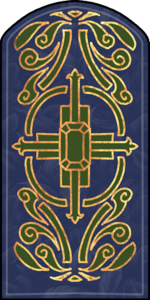
The Strongwards is the anglicized name of the Llynburh Chapter. This Chapter is situated in Ashaven at the foot of a volcano that the Mages in the chapter keep docile enough not to erupt, but active enough to help the soil with its nutrients. The Llynburh Chapter is primarily focused on the cleansing and healing properties of both Magic and Alchemy, particularly the latter being popular as the Chapterhouse has a massive Alchemical repository and herb and ingredient garden. The Chapterhouse also acts as a convalescing home for wounded Knights and locals, as Llynburh is known as the hospital Chapter. Llynburh members are taught healing Magic if they are Mages, and Alchemical and surgical practices if they are Mundane. Many of the Aelrrigan Mage-Knights operate from this Chapterhouse, meaning it is a popular Chapterhouse to go for lessons and training with the best. The Llynburh Chapter is also known for having many Warden Archon joining up, and even has a decently sized Draconism Temple nearby.
| Long Living |
You live much longer than the average life span of your heritage. You can live up to three times as long, and you can visually stop aging at a chosen age (must be at least 21). Additionally, you are immune to non-magical diseases and Afflictions. |
The Blazing Blades
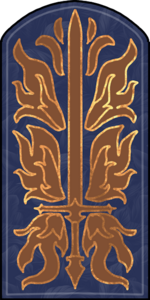
The Blazing Blades is the anglicized name of the Laoch Lasrach Chapter. This Chapter is the Chapter that specializes in the tactical, strategic, and mechanical combination of Magic with Melee fighting styles, thus championing the creation of the Spellblade Aelrrigan Knight. The Chapter however has had some calamity to weather, with the most recent being the utter destruction of their Chapterhouse in Èriu-Innis, at the hands of the Asha Corsair fleets that destroyed the land with their massive digging machines, causing earthquakes and landslides that collapsed the Chapterhouse. Laoch Lasrach Knights have a particular disdain for the Asha for this reason, even if they have temporarily established a new Chapterhouse in a horse-barn in Pach Lallach, Gallovia. Laoch Lasrach members tend to be the most unpredictable and emotionally passionate of the Aelrrigan Knights, first in a fight, and also first to argue against an order to retreat. In this sense, Carchar Knights usually act as their life-line in trouble.
| Magic Identity |
You choose one Magic School for free on top of your standard limit, but only receive a single Mechanic from it, regardless of your Magic Proficiency investment. However, you can freely choose which of the Mechanics within the Magic School that you gain access to. |
Burning Choir
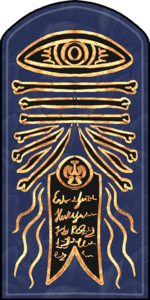
The Burning Choir Chapter has no formal Chapterhouse, nor does it have a formal hierarchy or structure. It is purely the administrative division in which the Aelrrigans confine the Relicsworn Undead, so that they always know how many there are, where they are, and what they are doing. The Aelrrigan Order ensures that the Magic holding the Relicsworn Undead together remains functional and well maintained, and ensure that they follow their purpose, which is to act as guardians of holy sites, pious individuals, and divine objects. Burning Choir members are not ever taught combat, because there is an assumption that they already know how to fight from a previous life. That being said, the Order does also maintain their armor in case of damage, and provides them a safe place and home-base from which to operate during times when they aren't working, or have to regroup to work with other Aelrrigans on major obstacles or missions for the Order.
Burning Choir do not receive a Mechanic, because Undead already have their own built-in Mechanics. For more information, refer specifically to the Relicssworn Undead Information on the Undead Page. It is not possible to be a different type of Undead.
The Sacred Hand
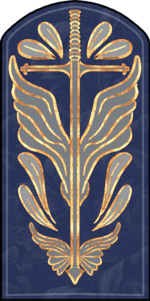
The Sacred Hand is the anglicized name of the Brezelourien Santel Chapter. This Chapter is found in the north of Ithania, in the lands inhabited by the Perrion Ithanians and Marvoudou Breizh sub-culture. The Brezelourien Santel Chapter specializes in the safeguarding, retrieval, and sanctification of holy artifacts. They do so with a strong focus on Unionist artifacts which habitually are more common than other Religions due to the sheer amount of Gods that Unionism has, and how many things they interacted with during their mortal life which ended up becoming holy Relics. The Brezelourien Santel Chapter was once formed from Eirlys's holiest warriors, and when she was incorporated into Unionism, they followed her and became the Santel Knights in the Aelrrigan Order. The Brezelourien Santel Chapter members are considered the most pious and religious fanatical of the Aelrrigans, frequently on some kind of personal obsessive holy quest to retrieve a long lost piece of armor from one of the God Emperors.
| Faith Destiny |
You have a Deity-Form Transformation, which transforms your body into that of a divine God-like superhuman warrior in appearance, larger, and clad in classical armor as a champion of the Gods. This change counts as a Transformation but does not count as a Disguise. You can design a general aesthetic angel-like appearance for different Religions, or have the appearance be strongly inspired by a specific Deity. Also while using this Transformation during Divinium summoning, Gods of your Religion may look more favorably upon you while this Transformation is active. |
Internal Aelrrigan Code
The Internal Aelrrigan Code contains additional Honor and Behavior Codes for Aelrrigan Knights that are supplemental to the Common Code described on the Knights Page.
- Aelrrigan Knights must ensure no dangerous Magic teaching material exists by burning forbidden Dark Magic tomes, and teaching proper usage to those who want to learn.
- Aelrrigan Knights must protect the (legal) repressed occult from hate-crimes and bigotry, both with verbal defense or with arms if they suffer unlawful attacks.
- Aelrrigan Knights must declare mages who use Magic for evil as Renegade Mages, and hunt them down to bring them to justice, or in last resort cleanse their Magic.
- Aelrrigan Knights must ensure that Grim Artifacts remain out of the hands of those who would ruin and destroy the world or the Regalian Empire.
- Aelrrigan Knights must search and banish hostile Spirits and Demons or Corrupted Souls by sending them back to the realm from which they came, and prevent their return.
- Aelrrigan Knights must aid and cover for Doomed Fates, making sure they are not captured by those who ensnare Spirits, and that they can work towards their purpose.
Aelrrigan Jobs
The Aelrrigan Order, just like other Knight Orders, has so called "Jobs" which are cornerstone occupations of the Knights. Any Knight can engage in these, but they are largely optional.
- Magic Investigations: When Aelrrigans run into unusual Magical phenomena, objects, or people, they should investigate, interrogate, and experiment as much as safely possible to learn as much as possible about it before compiling a threat level report. Ranking from F (low threat) to S (extreme threat), Aelrrigans should assess the danger to the world, stability, or the Aelrrigan Order (and indirectly, the good standing of Mage-rights in the Empire), before agreeing on a plan on how to deal with the entity. This should also be done for more routine threats, like Greater Vampires, Arken, Magical Events and so forth.
- Artifact Agents: The Aelrrigan Order polices the existence and use of Grim Artifacts. Grim Artifacts are those magical tools touched by the Death Gods, the Void Gods, or hostile Arken, and are generally considered tools of evil. While Grim Artifacts are not necessarily evil, in the wrong hands, they can do a lot of damage to the world or the Regalian Empire. The Knights are meant to meet in conclave to determine if any owner of a Grim Artifact is considered a threat to the Empire, and if deemed so, hunt them down to either disable their Artifactspark, or confiscate the Artifact altogether. Aelrrigan Knights are not allowed to own Artifactsparked Grim Artifacts.
- Doomed Fates: Doomed Fates are Primal Revenants who died before they could complete their mission (religious, or for the Regalian Empire), so not cleansed Spirits or Spirits who socially hang out without explicit purpose. Doomed Fates are considered "Good Spirits" in the eyes of Aelrrigans, and while they shouldn't outright and transparently help them by fighting with them, they should indirectly aid them by keeping those who would ensnare or banish them off their backs, and making their work easier to complete, for when they do, Doomed Fates can be at peace and pass on into the afterlife that is reserved for them, which is the fastest way to be rid of them.
- Magic Progress: Aelrrigan Knights are exceptionally politically active. Whether attempting to do so themselves, or urging and championing the cause of others outside of the Order, Aelrrigan Orders must ensure there is always some kind of pro-Magic legislation political party that aligns with their "freedom, but under order and control" policy towards Magic. This can be led by the Aelrrigans themselves, or by Noble allies in the peerage who look fondly on the Aelrrigans. The Aelrrigans should seek to reinforce such a political unity, and expand it by adding additional members or allies.
Aelrrigan Armaments
Aelrrigan Armaments are people with limited rights to operate as part of the Aelrrigan Order, but only under the direct supervision of the Aelrrigan Knights. This means they do not have actual ranks of privilege and rights, but can fight alongside the Viridian Knights. Aelrrigan Armaments must follow the Code of the Order, or the spirit of the Code of the Order insofar they are able to, and assist other Aelrrigans in doing so as well. Aelrrigan Armaments are:
- Attendant is a person, mundane or mage (not Automata, Homonculi, or Marken), who acts as a page to Knights.
- Brood Armaments are Vampire Broods, with or without magic, who act as assistants and wards to the Knights
There is a Registration duty for this Character type. If you play an Aelrrigan Armament, you must first secure an Aelrrigan to be subject to. When you have both that, and a Character Sheet, you can make a Ticket on the MassiveCraft Discord, and register your Aelrrigan Armament, which requires your in-game name, a link to your Character Sheet, and the name of the Aelrrigan your Character is subject to. Any Aelrrigan of any Chapter can retain any Armament, and there are no restrictions on the amount of Armaments, though each of these Armaments has some rules that apply across the board:
Attendant Armament
Attendant Armaments are like pages, who act somewhere between a messenger, servant, bodyguard, and ally to the Aelrrigan Knights they follow. Attendant Armaments often carry weapons and armor around, help the Knight in and out of their equipment, carry banners, proclaim their arrival, or act as representative to where the Knight cannot personally attend. Attendant Armaments are explicitly not Squires, and have no intention of ever joining the Order fully.
- Attendant Armaments can only ever serve one Aelrrigan Knight, and cannot do any Aelrrigan Knight business without that Aelrrigan Knight explicitly being present and instructing them to do so. The only exception is acting as messenger or envoy for their Aelrrigan Knight on their explicit orders. They must reject orders from other Aelrrigan Knights.
- Attendant Armaments are by extension of their Aelrrigan Knight allowed to enforce the law along with their Knight, but never independently. They cannot place citizens under arrest, and can only ever function as helpers to the Aelrrigans that they serve in the field.
- Attendant Armaments and their Aelrrigan Knights are not explicitly barred from fraternizing, but it is considered unkosher in a professional working environment, and potentially causes the Aelrrigan Knight to become conflicted in their priorities. Attendant Armaments are always replaceable and expendable, Aelrrigan Knights are not.
- Attendant Armaments must always be commoners, because it would be too humiliating for a Noble to be a servant, even to a Knight. Aelrrigans are encouraged to take on the downtrodden as their Attendants to give them some livable wage, but Aristocrats can also become Armaments because Attendants indirectly receive the prestige of their Aelrrigan's success.
- Attendant Armaments cannot ever rank up into being a Squire or Aelrrigan Knight fulltime, and should never try to aim for this either IC or OOC. Attendant Armaments are meant to appeal to the quintessential medieval Knight's page, they are more servant than Knight, and are only really suitable for people who stick to the concept long term because they adore the aesthetic of that servant role to a glory seeking Knight.
Brood Armament
Brood Armaments function like the hired and protected wards of the Aelrrigan Order, who typically take on a supportive, scholarly role. While the Order, like all others, does not accept Broods into its ranks formally, many Aelrrigan knights created less direct positions that Broods could be "hired" into, leading to the formal establishment of the Brood Armament. Brood Armaments serve whatever role their respective Aelrrigan Knight needs of them, which is typically as assistant mages, scholars, medics, or as people who look after Chapterhouses. Brood Armaments are explicitly not Squires, and cannot ever join the Order.
- Brood Armaments can only ever directly serve one Aelrrigan Knight, but can do Aelrrigan Knight business with other Aelrrigans. They must listen to orders from other Aelrrigan Knights, unless it conflicts with orders from their specific Knight.
- Brood Armaments cannot enforce the law along with their Aelrrigan Knight, but can assist in protecting their Knight in combat. They can legally cast Magic, but only when directly and publicly ordered to do so by their Aelrrigan Knight.
- Brood Armaments and their Aelrrigan Knights are allowed to fraternize, within reason, as the position requires the Brood be on board and willing.
- Brood Armaments must always be commoners, because it would be too humiliating for a Noble to be a servant, even to a Knight. Aelrrigans are encouraged to take on the downtrodden as their Brood Armament to give them some livable wage, but Aristocrats can also become Armaments.
- Brood Armaments have access to a badge that other Aelrrigans, certain Knights, and certain Metro members will recognize. This badge identifies them as a Brood Armaments, and shields them from the typical suspicion and hostility levied at Broods (especially by certain NPCs). Brood Armaments who are arrested for just being Broods, for example, can rely on this to ensure an Aelrrigan will come see them freed from Prison. Because these are made by Mage-Knight Caan, they are explicitly magical, and cannot be stolen, replicated, duplicated, or destroyed, except by entities on the same level as, or higher than, Caan.
- Brood Armaments are enchanted by a unique spell that is proprietary to the Order, which only works on willing Broods who join as Armaments. The spell does not protect them from Sanguine infection, but if they are ever infected, it will immediately and instantaneously alert their Aelrrigan Knight that they have been infected, allowing for swift curing. This spell works regardless of distance, and can only theoretically be tampered with by higher powers.
- Brood Armaments cannot ever rank up into being a Squire or Aelrrigan Knight fulltime, and should never try to aim for this either IC or OOC. Brood Armaments are meant to appeal to the honorable dhampir fantasy, which is typically unavailable to broods for knighthood. They are really only suitable for people who stick to the concept long term because they adore the aesthetic of that servant role to a glory seeking Knight.
History
Aelrrigan Order history is closely linked with Breizh cultural history, as its founding location was the Kintyr lands in the Regalian Archipelago. Its foundation is linked to the Dydd y Farn, a term that is loosely translated to Doomsday Prophecy, but rather than a set of tenets and beliefs, it actually refers to a highly unusual meeting and the events that came as a consequence of that meeting. To understand the event however, it is important to understand the context in which it took place. Kintyr at the time was one of the most divided but also populous regions in the Regalian Archipelago, which was nonetheless troubled by the Elven raids in the surrounding lands. Kintyr was unable to properly unite a common force against the foreign invaders because their land was so bitterly divided over religion. In almost equal numbers, the Breizh people were Draconists of Regulus, Fornoss followers of both pantheons, and held a unique religion called the Weards of Eirlys, with all three religions making up roughly a third of the total population and splitting it three ways. An often unspoken about topic that also bothered them, were the Void Conduits. A Conduit happens when a large amount of Void Magic or Exist Magic converges in an area to saturate it to such a degree that it becomes cancerous to anything living in the area, and rots anything that comes in contact with it. Void Conduits happened more and more as the world came closer to the Void Invasion, though obviously the denizens of the world did not yet know it was coming. These Void Conduits manifested all over the Regalian Archipelago but also in Kintyr, because of the rampant Magic usage halfway across the world in the Allorn Empire.
The Dydd y Farn refers to a meeting of the three Religions in the valley called Meysydd Siarad in Kintyr. First came the Dragon Regulus assuming Ailor form with long black hair, silken robes and purple eyes. Second came Eirlys, white feathered wings with songs of the fae from the clouds, and third came a pairing of Fornoss gods, riding a long thunderous strike. Which pairing of gods this was is probably the only unclear part of this legendary meeting, but guesses range from Bard and Svol to it instead being two Arken acting on behalf of the Fornoss pantheons as representatives. The meeting is well recorded, because the faithful took effort to announce this coming meeting ahead of time, meaning hundreds if not thousands of people were present to witness it from all faiths. During the Dydd y Farn each divine representative of their Religion made a verbal agreement and demand of the Kintyr people to set aside their religious differences, and unite against the threat of the Void Conduits, which were causing a plague on the land called the Black Mold, a high contagious disease that was caused by inhaling Void corrupted spores, with guaranteed fatality. The divine entities made it abundantly clear that this unification was necessary, to prevent utter calamity. This event is exceptional for each Religion even, as Dragons were not known to interact this much with their own worship which they often disregarded, and it is also the only recorded time in history when gods of different religions were present in the same area, let alone preaching a common goal.
Each of the divine beings demanded a unified effort on the part of the Breizh people, to form the Aelrrigan Dathonair, the forerunner of the modern Aelrrigan Order. Each of the royal houses (which would later become the Ducal houses as petty Breizh royalty wasn't the same as Imperial royalty) swore fealty to the Dathonair, giving their second born sons up to the Order to be guided by the Gods. In return, the Gods taught the Dathonair the complex and dangerous rituals involved in cleansing the Void Conduits, calling upon a mixture of Dragon, Fornoss, and Wearden powers to bring a halt to the Black Mould plague that was sweeping the region. It is mostly this event and subsequent formation of the Dathonair that modern scholars credit as the reason why nobody really remembers just how awful the Void Conduits were, as they were so successful, that after 200 years, there were no Void Conduits left. Some even dare speculate that because the Dathonair cleansed the lands, by the time Cataclysm happened (which in itself was a very destructive magic-caused event) there wasn't enough magical energy on the Archipelago for the Cataclysm to erupt like a catalyst, thus preventing any major natural disasters in the area and setting up the Regalian Empire with an easy start five years later.
The Dathonair continued their work even into the founding of the Regalian Empire. The Wearden of Eirlys as a standalone Religion would soon cease to exist, as the Concilly Council incorporated the Wearden into Dogmatic Unionism during the first schism, after which the second Emperor of Regalia re-confirmed the commitment of the Everwatcher to uphold the pact made by Eirlys during the Dydd y Farn. In essence, Unionism took over the responsibility of the Wearden of Eirlys, as Unionism replaced said Religion, while Draconism and Fornoss worship remained in place, with various priests of both Religions also ratifying the succession of Unionism which holds more or less to this day. With the Empire's somewhat loose attitude to Magic early on, the Dathonair were able to continue doing their work, but also found because of their efficiency, that little work had to be done. This in turn invited complacency among Regalian officials about the need of the Dathonair. This came to a head roughly 70 years after the first Unionism Schism, when anti Evintarian sentiment and the concept of magical mutations and evolutions gave rise to strong purist sentiments.
The dark times for the Dathonair truly set in when anti-Magic Regalian sentiment peaked in 100 AC with the creation of the Azure Order, allowing Grand Vigil Nicholas to implement his anti-Magic reforms. A true purge followed where many non-Magi signed up to the Azure Order and spread out across the Empire to hunt down Magic users, including Dathonair Mage-Knights. Many of the Dathonair Sanctuaries and Chapter houses were burned, with the Knights slain or imprisoned in the Azure Spire in the City of Regalia. Few of the Order survived without being captured, and most of the Bayor tapestries recording the history of the order were lost, or hidden away and soon forgotten as their protectors were slain elsewhere and taking their location with them to the grave. In 140 AC, the Azure Order declared the Dathonair destroyed, with the burning of Grandmaster Robwyn of Coltyr, being the last captured Dathonair who hid away in the mountains of Alstyr in Kintyr.
The spirit of the Dathonair was kept alive by those proud Ducal families who had once been the first to pledge their allegiance nearly 1200 years prior, hiding their bayor tapestries that recorded the codes and conduct of the Dathonair. They even kept alive knowledge of the rituals and artifacts used to cleanse Conduits, even though none of them were actually trained how to use them. It is during this time that some Fornoss and Draconists blame Unionism for radicalizing and breaking the Dydd y Farn, but reality is far more complicated. By this time, Draconists had also soured on Mages, with the notable Gray Witches in Anglia becoming extremely xenophobic towards Magic users and infected, refusing to even cure simple magical ailments. Similarly, the Fornoss worshipers in the region had been dealt a heavy blow by Magic-using Solvaan who supported the Regalian Empire in the Skagger Wars, thus increasing anti-magical sentiment (also because Elves were very popular among the Dathonair, and commonly lived in Kintyr also). With the death of all Dathonair and the loss of know-how to destroy Conduits, the Azure Order that once hunted the Dathonair now turned their destructive means on the Conduits, causing a lot of collateral damage in the process as they started appearing more and more as time passed further since the death of the last Dathonair.
It was however Unionism that also breathed life back into the compact, during the reign of Emperor Justinian II. Emperor Justinian along with the succeeding Kade dynasty, would later be known as the People Realists, or ruling entities that were more aligned with the needs of the people, than the needs of the Nobility. In doing so, Emperor Justinian II became acutely aware of the effect of Azure cleansing on the people. Far from the Dathonair cleansing rituals of old and the healing of the local population, the Azure Order would call down an extermination order on areas which housed Void Conduits, using cannons and explosive barrels to turn the area into a massive crater, thus denying the Void any matter to hold onto, while also hunting down any person who would have come close to the Conduit and putting them to death as a precaution for Void Demon infestation. This had a huge toll on the local population, and turned sentiment against the Azure Order at large.
Despite severe protests from the Azure Order, the ban on the Dathonair was rescinded by Justinian II in 270 AC, which immediately resulted in the Conclave of Coltyr, where all the major Ducal families brought the remnants of what they had hidden of the Dathonair together, and re-founded the order. This time, to distinguish it from the past, it was referred to as the Aelrrigan Order, leaving the history of the Dathonair in the past. The struggle over influence between the Azure Order and the Aelrrigan would continue until the former's destruction at the hands of the Deathling Occupation. Emperor Alexander I simply never renewed the charter for the Azure Order, and as such, the Aelrrigans had essentially outlived their foe, and were free to formally exist as a Knightly Order without organizational enemies, who would nonetheless later re-appear as Lothar Knights.
The Coup of 312
In July 312, Second Mage-Knight Caan overthrew the Aelrrigan Elders and Grandmaster and established a unitarian rule under his sole authority, backed by the other Mage-Knights. While regarded with discomfort from a purely legal standpoint, the Imperial Court has seemingly ratified the change in leadership and committed to preserving the chapter under Mage-Knight Caan's leadership, because he is also recognized as a still-living Unionist God. As a result of the Coup of 312, Caan instituted a new Code and new directive for the Aelrrigan Order, dismissing the Doomsday Prophecy as false anti-Magic propaganda, and installing a more pragmatic and magic-favoring attitude in the order. Caan's hostile takeover of the Order resulted in the exiling of a sizeable portion of the Aelrrigan High Command, as well as many knights who held onto the Doomsday Prophecy or just objected to the concept of a hostile takeover within the Order. These Knights all split into various smaller factions, some turning their backs on knighthood, some joining the Bloodcast Order, and others yet might even turn to the Argentum Order. Under the direct control of now Mage-Primarch Caan, the Order has taken a more tolerant view of Magic as a whole, Artifacts, as well as even Spirits, picking and choosing where to fight instead of provoking collateral damage from ostensibly harmless entities and situations.
| ||||||||||||||||||
| Accreditation | |||||||||
|---|---|---|---|---|---|---|---|---|---|
|
| ||||||||